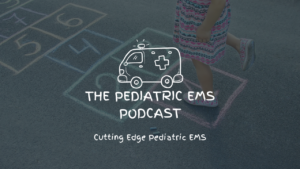Expedite The Route, Simplify The Dose: Managing Pediatric Prehospital Seizures

Brought to you by The National Association of EMS Physicians (NAEMSP)
Hosts: Dr. Joelle Donofrio-Odmann and Dr. Joseph Finney


Website:
https://directory.libsyn.com/episode/index/id/26196993
Direct Download:
Content Experts: Manish Shah, MD, Denise Whitfield, MD, Rejean Guerriero, DO
B-side Narrator: Joelle Donofrio-Odmann, DO
Editing and Publication: Joseph Finney, MD
Episode Summary
I know it’s been a minute, but we are glad to be back to bring you an extremely important episode focused on the prehospital management of pediatric seizures. Seizures are one of the most common reasons EMS is called for a pediatric patient and prompt termination of that seizure can be lifesaving. A prehospital pediatric seizure is not only one of the scariest events for a parent, but it is also high stress for the paramedics and with pediatric airway management, medication dosing, and a stressful scene all piling up in the head of a paramedic, this seemingly simple call can become an immense challenge for even the most experienced clinician. But you don’t have to worry about that next call for a pediatric seizure. We at The Pediatric EMS Podcast have teamed up with 3 experts you will meet throughout the episode to break it all down and walk you through each critical aspect of pediatric seizures from understanding what a seizure is, what your priorities in treatment need to be, and finally how to systematically approach the patient to ensure you safely, effectively, and quickly manage your next prehospital Pediatric seizure. We will provide you with evidence-based recommendations to simplify the treatment of this scary EMS encounter. We are going to solidify your understanding of the priorities in managing a pediatric seizure from both the medic and medical director perspective so you can intervene rapidly and successfully the next time you get this call. Let’s get started!
In this episode:
- Why pediatric seizures are so challenging for EMS clinicians
- When and how to successfully treat seizures
- Medication route, dosing, and monitoring
- What a pediatric seizure is and why we treat them
- Advice for medical directors to ensure medics are ready for this call
Key Take-Aways:
- Medical directors create simple straight-forward protocols
- Be on the lookout for ongoing seizures, they can be subtle
- If you aren’t sure, treat it!
- Keep medication routes and dosing simple
- Intramuscular midazolam 0.2mg/kg (max 10mg) x 2 doses seperated by 5 minutes
- IV NOT NEEDED!
- Monitor your ABCs
- ETCO2, monitors, pulse oximetry
- Shoulder roll to support the airway
- Hold the phone on that glucose check
- Check it but do it after these other interventions
Our guest experts:

Manish Shah, MD, MS
Dr. Shah is a Professor of Pediatrics in the Division of Emergency Medicine at Baylor College of Medicine in Houston, Texas. Dr. Shah is a supremely accomplished prehospital pediatric researcher. the Co-Chair of the Assessment Subcommittee for the National Prehospital Pediatric Readiness Project since 2019. His research is focused on the integration of pediatric evidence into EMS protocols. He is The Principal Investigator (PI) for the Charlotte, Houston, and Milwaukee Prehospital (CHaMP) research node of the Pediatric Emergency Care Applied Research Network (PECARN). Dr. Shah is the Principle Investigator for Pedi-Dose, the pediatric seizure dose optimization study within PECARN working to optimize pediatric dosing for seizures in EMS.

Rejean Guerriero, DO
Dr. Guerriero is a pediatric Neurologist and physician scientist at Washington University School of Medicine and Saint Louis Children’s Hospital. Dr. Guerriero is an expert in Epilepsy, critical care neurology, traumatic brain injury, general neurology; ICU-EEG, status epilepticus, and refractory seizures. Dr. Guerriero works closely with the Special Needs Tracking and Awareness Response System (STARS) to ensure prompt, tailored, and effictive care for pediatric patients with complex medical needs by EMS.

Denise Whitfield, MD, MBA, FACEP, FAEMS
Dr. Whitfield is the Director of Education and Innovation at the Los Angeles County EMS Agency. She is a former Commander in the U.S. Navy with extensive experience delivering emergency medical care in diverse environments. She spent 12 years on active duty, with combat deployments to Iraq and Afghanistan. As a Naval Flight Surgeon, she completed operational assignments with the Marine Corps. As her final Navy assignment, she served as a White House Physician where she conducted operational medical planning and ensured medical care delivery for the President, Vice-President and First Lady. Dr. Whitfield completed an EMS fellowship with LA County and joined the EMS Agency in July 2018. She currently directs education programs at the EMS Agency including annual EMS Update the EmergiPress continuing education newsletter. She is an Assistant Professor of Clinical Medicine at the David Geffen School of Medicine at UCLA and serves as faculty for the EMS Fellowship Program at Harbor-UCLA Medical Center in collaboration with the Los Angeles County EMS Agency. Dr. Whitfield recently published “The Effectiveness of Intranasal Midazolam for the Treatment of Prehospital Pediatric Seizures: A Non-inferiority Study” in the journal Prehospital Emergency Care.
Episode Resources
Dr. Whitfield’s publication
https://pubmed.ncbi.nlm.nih.gov/33656973/
Whitfield D, Bosson N, Kaji AH, Gausche-Hill M. The Effectiveness of Intranasal Midazolam for the Treatment of Prehospital Pediatric Seizures: A Non-inferiority Study. Prehosp Emerg Care. 2022 May-Jun;26(3):339-347. doi: 10.1080/10903127.2021.1897197. Epub 2021 Mar 29. PMID: 33656973.
STARS: Special Needs Tracking and Awareness Response System
https://www.glennon.org/what-we-do/stars-special-needs-tracking-and-awareness-response-system/
Resources from Dr. Shah

